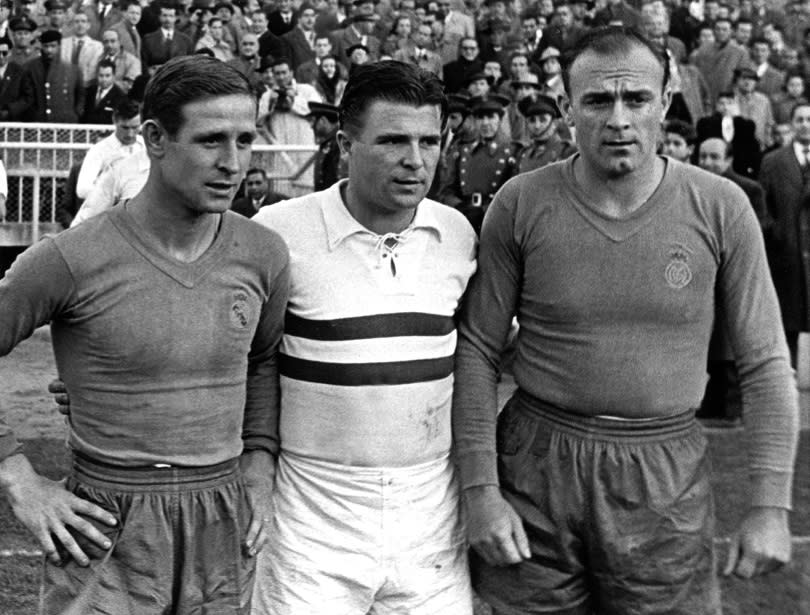9 times football fell victim to fake news: arrests, deaths and sex changes
1. Puskas back from the dead
In the midst of the Hungarian Revolution in October 1956, the legendary Ferenc Puskas was reported to have been killed by gunfire “while manning the barricades for freedom against tyranny”. The Manchester Guardian even ran a front-page obituary “with an infinite sadness”.
Yet within 24 hours, state radio confirmed that Puskas was alive and very much kicking; a month later he defected, vowing to never play for his country again. "The pressure and the worry it put my family through was awful," the the inside-forward later reflected.
When Puskas finally joined Real Madrid in 1958, supporters held up a banner reading: “De Entre Los Muertos” (“Back From The Dead”). Opposition defenders probably wished he'd stayed in Hungary.

Puskas (centre) pictured 18 months after he supposedly passed away
2. Car-eer pause
After a heroic penalty shootout performance in Steaua Bucharest’s victory over Terry Venables’ Barcelona in the 1986 European Cup Final, goalkeeper Helmut Ducadam allegedly complained at the post-match banquet that a car wasn't an adequate reward for the glory he'd brought to Romania.
“The Hero of Seville” promptly disappeared that summer, amid wild rumours that he’d been shot dead or had his arms cut off by leader Nicolae Ceaucescu’s vengeful agents. The truth was rather more mundane, although still serious: weeks after the final, Dudacam contracted a rare blood disorder which prevented him from playing. Arms still intact, he returned three years later with lower-league Vagonul.
“I can confirm that I’m very much alive,” reported a distinctly miffed Malcolm 'Supermac' MacDonald in 1978 after local radio stations had broadcast details of his death in a car crash on the M1 that morning.
The story at least contained a grain of truth: another Mr MacDonald had perished in an accident in Bedfordshire that same day, which led to a tabloid writer putting two and two together and getting five.
"I'll never speak to the journalist who spread the story for the rest of my career," the Arsenal striker fumed. He was as good as his word.

Reports of MacDonald's death were greatly exaggerated
4. Kim Jong-un, rest of world nil
In 2014, swathes of YouTube users were duped by a spoof video which appeared to show a North Korean news broadcast proudly announce that the national team had reached the World Cup final. The clip, which was uploaded by YouTube channel Korea News, featured a female news anchor from a state-run news channel explaining to viewers that the team would face Portugal in the final.
Throw into the mix the fact that they’d apparently beaten rivals Japan 7-0, China 2-0 and the USA 4-0, and it seemed the perfect script. But language specialists discovered that the dialect was wrong and the presenter’s voice was out of sync with her lips.
To cap it all, the North Korean government showed brief highlights of the tournament (for which they failed to qualify) on national TV anyway. Nice try, pranksters.
5. Cosmetic signing
It’s tough for news agencies to separate fact from fiction in the transfer market these days, what with that internet thing around.
In January, Sky Sports excelled themselves by revealing that Aberdeen had signed Turkish midfielder Yerdas Selzavon; it later turned out that the fake story had come from a fake Twitter account (@AberdeennFC), which was paying homage to the famous (ish) Scottish put-down "Yer Da sells Avon". Unsurprisingly, he's yet to make his Dons debut.

6. A dodgy Leed
When a group of Leeds-based Carnegie College footballers landed at Zambia's Lusaka airport in 1990, they received the shock of their lives. Team member Paul Jones recalled that "there were camera crews awaiting our arrival" and insists he and his colleagues had no idea what was going on.
The reason for all the unexpected attention was a story in the Zambia Daily Mail which claimed that Leeds United would be arriving in Lusaka for a three-game tour. Howard Wilkinson's men, who'd just won the Second Division, were actually 6,000 miles away, but that didn't stop the Carnegie College boys being treated like royalty.
When the visitors were comfortably beaten by all their opponents, though, Zambian supporters realised something was amiss. It later emerged that a tour promoter, who leaked the story to the Zambian press in a bid to inflate crowds and make some money, was to blame.

Leeds went on to win the First Division title two years later
7. A spy called Steve
False internet rumours proved mighty troublesome for ex-Coventry goalkeeper Steve Ogrizovic in 2003: reports claimed he'd been arrested on suspicion of spying in Kazakhstan during a fundraising trip around the world for the Over The Bar charity.
“Here is our petition to Tony Blair and the Kazakhstani government demanding the release of footballing legend Steve Ogrizovic," announced the 600-strong Free Steve Ogrizovic Group, with one plea describing him as “a bent-nosed hero to millions”. But they’d all been duped: Oggy confirmed in the Coventry Evening Telegraph that he hadn't travelled to the country and had no plans to do so. Shame.

Now Coventry's goalkeeper coach, Ogrizovic still hasn't been spotted in Kazakhstan
8. Frock-less Powell
“One ex-footballer is now living as a woman,” radio loudmouth Danny Baker once asserted, “and I can confirm it’s former Norwich City defender Tony Powell.” Powell, one of the toughest defenders of his generation in the 1970s, was eventually tracked down to a hotel in Hollywood, where he categorically dismissed the rumours.
"I'm all bloke I can assure you," he insisted. "I’ve never worn a frock in my life, and am the least likely man to have a sex-change operation. I hope that everyone is now clear.” Crystal, Tony.

Perhaps it was Powell's hairdo that fooled Baker
9. Lost in translation
When devastated West Ham striker Marco Boogers went AWOL after being sent off in his second appearance for the Hammers in a clash with Manchester United in August 1995, false tabloid rumours claimed that he lived in a caravan.
It remains one of football’s enduring myths, but the entire story is baloney, as former club employee Bill Prosser explained: "Marco was depressed after being banned for four games and disappeared for a few days. West Ham's Clubcall reporter phoned me and said he was trying to find Boogers for an interview but couldn't reach him. He asked if I had booked any flights for him. I told him I hadn't, but added: 'If he has gone back to Holland, he's probably gone by car again.’”
And so – with the Clubcall man convinced Prosser had said "he’s gone to live in a caravan", the false news about the Dutch striker spread like wildfire.
Thank goodness alternative facts like this are no longer tolerated.

Perhaps Boogers would have been better off staying in a caravan - he failed to score during his time at West Ham

 Yahoo Sport
Yahoo Sport 























































